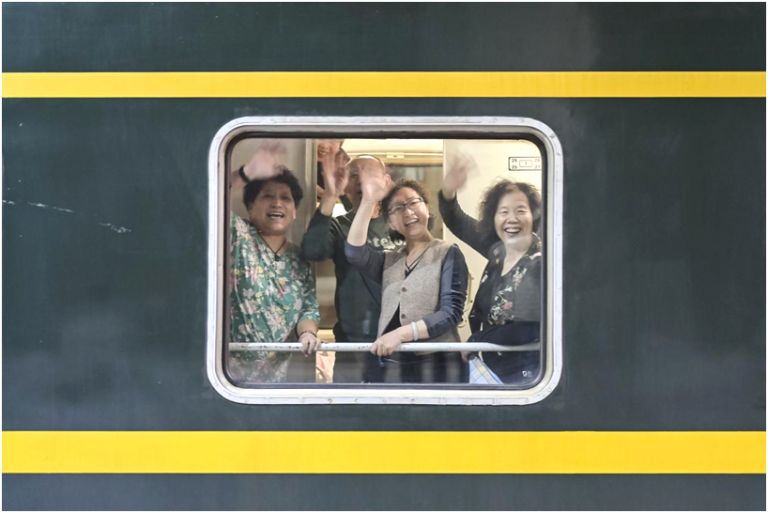
By Yin Jie, Cao Ruitong
Seniors are one of the most active groups in China’s tourism industry today. They are taking scenic train rides to the mountains to avoid the summer heat, traveling around the world on cruise ships and even camping in the wild.
According to the China Tourism Academy, there will be over 100 million healthy young-old travelers in China who travel frequently and are willing to spend money on their tours by the end of 2025, and the silver tourism market is expected to hit a trillion yuan ($138.18 billion) by then.
Chinese online travel agency platform Tongcheng Travel said silver tourism is one of the most powerful segments driving the recovery of the Chinese tourism market this year.
Senior tourists now make up the majority of the customers of travel agencies, said vice president of the company Yin Shuhu.
Seniors have more free time and their health conditions have been constantly improved. Besides, they are much wealthier than before. These all make it easier for seniors to go on trips and have laid a solid foundation for the rapid development of silver tourism.
The aging society in China also contributes to the rapid development of silver tourism. As of the end of 2022, the number of Chinese people aged 60 or above accounted for 19.8 percent of China’s total population. The National Health Commission estimates that the figure would exceed 30 percent around 2035.
Today, more and more seniors from medium- and small-sized cities and rural areas are traveling frequently.

Senior tourists pose for pictures in the Nanshan Cultural Tourism Zone, Sanya, south China’s Hainan province. (Photo by Chen Wenwu/People’s Daily Online)
Ma Yiliang, chief statistician of the China Tourism Academy, told People’s Daily that many of the earliest migrant workers in China are now over 60, they are more willing to travel and see the world after long time of working out of town.
Wellness-oriented seasonal tourism has become a new business form in the travel industry favored by more and more senior tourists.
A man surnamed Wang in Beijing would spend some time living in southwest China’s Yunnan province every summer after he retired.
“I love the rainforest there, where I can enjoy both beautiful views and fresh air. It’s good for my health,” he said.
Regions across China are continuously upgrading relevant facilities to meet the growing demand of senior travelers.
For instance, Wulong district of southwest China’s Chongqing municipality has renovated barrier free passages, elevators and escalators at tourist attractions and installed handlebars for 1,000 toilets. The Zhusha ancient town, a renowned tourist destination in Wanshan district of Tongren, southwest China’s Guizhou province has equipped itself with nearly 1,000 hospital beds and launched cooperation with local hospitals, so as to rapidly respond to medical needs of senior tourists.

Train Y124 departs from Harbin, northeast China’s Heilongjiang province, and starts a 17-day journey that passes Yunnan, Guizhou and Jiangxi provinces, March 18, 2023. (Photo by Yuan Yong/People’s Daily Online)
A report issued by the China Consumers Association showed that the young-old are more energetic consumption-wise and there’s an obvious trend of consumption upgrading among this group. The consumption environment for seniors still needs to be optimized in an elderly-oriented manner, the report said.
Digital gap is an important factor that negatively impacts the experience of senior tourists, said a survey.
Dai Bin, head of the China Tourism Academy, noted that efforts shall be made to fill the digital gap and build an “intelligent engine” that promotes integrated development of wellness tourism and smart tourism and nurture a barrier-free environment for the silver tourism market.
Besides, demand-oriented and targeted tourism services shall also be provided to meet senior tourists’ physical and mental health demand, Dai added.
Digital elderly-oriented services are being constantly optimized across China. Shanghai’s municipal bureau of culture and tourism has launched an elderly version of a local tourism mini program, which enables senior tourists’ families and friends to book tickets of scenic spots for them online. With this mini program, senior tourists above the age of 65 can enter tourist attractions without appointment. East China’s Jiangsu province has launched a digital tourism card that enables senior residents to enjoy transportation, tourism and consumption services. On the tourism mini program launched by Guizhou province, senior tourists can not only check maps, search for bathrooms, and have digital tour guides, but also call the police or ask for rescue in just one click once emergencies happen.










